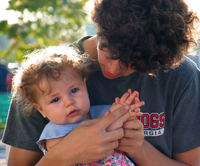
Some common expressions are remarkably misleading.
For example, “she eats like a bird.” Really? Most birds consume half their weight
in food every day. I hope she doesn’t!
Then there’s “I slept like a baby.” You tossed and turned and woke up crying every
2 hours, and it took you an hour to fall asleep again each time?
Let’s look at one more: “Philadelphia, City of Brotherly Love” *
That’s strange. According to FBI 2009 violent crime statistics for U.S. cities with a
population of 250,000 or more, Philadelphia ranked 11th worst (out of 75) with
12.38 cases per 1,000 people. For sake of comparison, New York ranked 54th with
5.52 cases per 1,000 people.
Maybe Philly means it on the Biblical level, and they’re being sarcastic.
I’m serious. One of the topics I’m most often asked to write about is sibling rivalry.
I’ll begin by using the Chumash as a guide to realistic expectations.
The very first siblings, Cain and Abel, didn’t get along very well, with lethal results.
Then, Yishmael wanted to kill Yitzchak Aveinu, a”h. Esau had homicidal intentions
towards Yaakov Aveinu, a”h. And some of Yosef ha’tzadik’s brethren nearly caused
his demise, albeit with perceived justification. Sibling rivalry is ancient, common,
and perhaps, innate.
An innate proclivity, preternaturally overcome by rare individuals, such as Moshe
Rabbeinu and Aharon haCohen. According to the Medrash Tanchuma (Shemos,
section 25, page 32 in the Zichron Aharon edition 5768), Moshe’s apparent
diffidence at the burning bush was actually a concern for the honor of his older
brother, assuaged only when HaShem told Moshe that Aharon would rejoice “in his
heart” when he met Moshe in this role. The Tanchuma emphasizes Aharon’s
sincerity, and the commentary Zicheira l’Chaim (R. Chaim Falagy, z’tzal) tells us
that it’s rare. He writes that the word “achim” is an acronym for “Aharon chiba
yisaira Moshe,” Aharon had exceptional love for Moshe. To quote the Eitz Yosef,
(ibid), “They loved each other and celebrated the other’s success; this is not the
way of brothers.”
Why not? Pirkei Avos spells it out. In chapter 4, mishna 21, Rabbi Elazar
HaKappar said: Jealousy, lust and the [pursuit of] honor remove a person from the
world. Rav Shlomo Kluger of Brod in his commentary Magen Avos has a fascinating
interpretation of the expression “remove a person from the world” which can help
us understand the difficulty of overcoming sibling rivalry. He explains that the
Mishna is referring to the World to Come, and that one who sins with jealousy, lust,
and the pursuit of honor is brought to Gan Eden and then removed, in order to
suffer jealousy, loss, and dishonor. Rav Kluger explains that this is midah k’neged
midah. This person sinned because of what he saw other people enjoying. His
punishment is most appropriate because he gets to see the Paradise others are
enjoying and then loses it.
When a person sees his neighbor and is jealous of who he is, desirous of what he
has, and resentful that he is more highly honored, he can placate and soothe
himself with the following thoughts:
His life may look idyllic to me, but I really don’t know all that much
about what it’s like to be him. There are probably lots of things about
his life that are unpleasant and if I knew them, I wouldn’t want to trade
places with him.
With these reflections, he has changed his thinking, and that caused his feelings to
change. He’s no longer feeling jealous, desirous, and resentful.
What happens when such feelings of jealousy, envy, and resentment are directed
not at his neighbor, but at his brother? What can he say to himself now?
His life looks idyllic to me, and I know all about what it’s like to be him.
I don’t see much about his life that is unpleasant, and I wish I could
trade places with him. It’s not fair that he gets to be him and I’m stuck
being me.
Parent: Okay, Rabbi Ackerman, you’ve talked about how difficult it is to overcome
these feelings and even more so when they’re directed toward a sibling. But what
makes you so sure that these feelings are ubiquitous, and as you describe them,
innate?
Me: Because these feelings go all the way back to Adam haRishon, before he ate
from the aitz hadaas tov v’ra. The Pirkei dRabbi Eliezer says that jealousy, lust,
and desire for honor caused him to commit that first sin, as implied by the Mishna’s
wording, “motzi’in es ha’adam [alluding to Adam] min ha’alom.” These feelings led
to Adam and Chava being taken out of Gan Eden, the first example of the type of
punishment that R. Shlomo Kluger described. They were there, and they lost it.
Parent: So this is why so many siblings had such terrible difficulties, and the first
ones who overcame these feelings were Moshe and Aharon?
Me: Yes that’s what I saw in the midrash Tanchuma. But I then found something
else, an account of remarkable siblings from a few generations earlier. In Igra
D’Kallah, Rav Tzvi Elimelech mi’Dinov writes:
When Yaakov Aveinu put Ephraim ahead of Menashe, he saw that
Ephraim did not become haughty towards his brother and Menashe did
not become jealous of his brother. That’s why Yaakov blessed them to
be the model of bracha for all generations.
(Avos [ed. Misivta] Perek 4 Mishna 21, in “kaftor v’ferach”, page 82)
It’s a bracha we offer to and wish for our children, and hope they’ll reach such a
level sometimes. It’s not realistic to expect it always, maybe not even often.
How do you help your children when they’re struggling with sibling rivalry? G-d
willing we’ll look into that next week.
* “City of Brotherly Love” isn’t a nickname. It’s the translation of the Greek word
Philadelphia: philos-love and adelphos- brother.
Rabbi Yitzchak Shmuel Ackerman, LMHC. Men’s and women’s parenting groups
now available. Call for details: 718-344-6575.

 Previous
Previous

